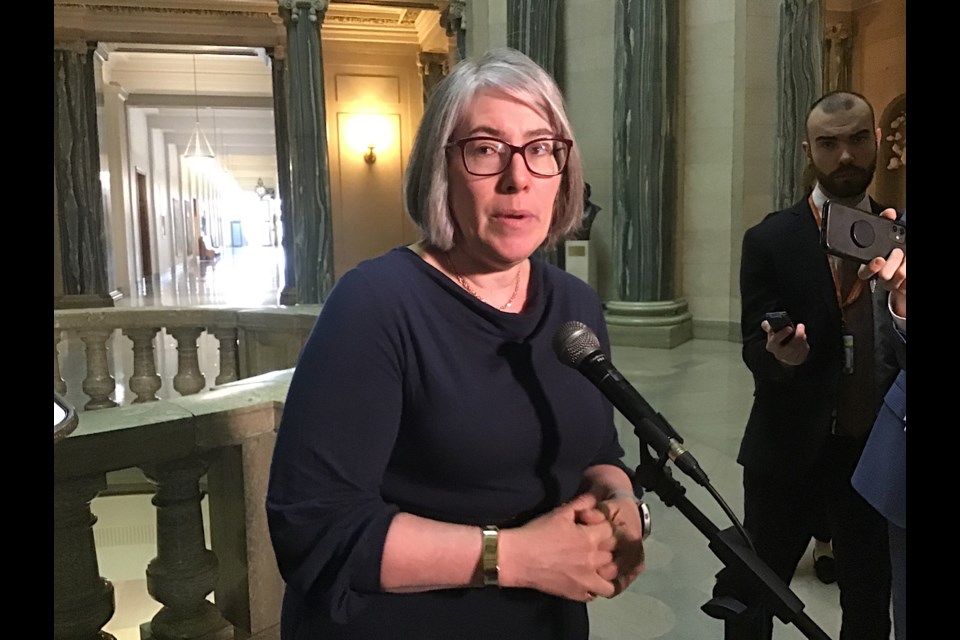REGINA - The Official Opposition was mainly focused on a single issue at the legislature Thursday: the financial crunch facing the University of Regina.
Minister of Advanced Education Gordon Wyant had to fend off a barrage of questions from several Opposition critics on the topic Thursday during Question Period.
According to the Hansard account, Opposition critic Nicole Sarauer led off by asking “what doesn’t this government understand? Don’t they realize that any shortage of workers today is a direct result of their failure to support public education and our universities?”
“I don’t know where the member’s been, Mr. Speaker,” Wyant responded.
“A number of years ago, Mr. Speaker, we signed a historic funding agreement with our post- secondary institutions to provide stable and predictable funding to our institutions, Mr. Speaker, all of which at the time spoke highly of the work that was done by the government, by my good friend the member from Gardiner Park who shepherded that agreement through, Mr. Speaker.”
Wyant would refer to that agreement numerous times as he responded to more questions from Sarauer and also from Opposition critics Jennifer Bowes, Betty Nippi-Albright, and Trent Wotherspoon.
Sarauer pointed to “reports of deep cuts at the University of Regina as a result, a direct result, of this government’s choices.”
Wyant: “I kind of wish that the member opposite would have listened to my last answer, Mr. Speaker. In the last year, $116 million has been provided to the University of Regina, Mr. Speaker, including additional funding to our post-secondary institutions in the first two years of our funding agreement, Mr. Speaker, to allow those institutions to make strategic investments to ensure their financial viability going into the future.
“Mr. Speaker, all our post-secondary institutions spoke highly and favourably about the work that was done to create a situation where we had stable and predictable funding for our post- secondary institutions, something that never happened before, certainly something that never happened when those people had the privilege of forming government, Mr. Speaker.”
In her remarks, the Saskatoon University MLA Bowes noted that Britt Hall, the President of University of Regina’s Faculty Association, was in the gallery.
“She’s here today because of the dire situation facing the U of R. Deep cuts are on the table, people are worried, and there’s no way to keep offering high-quality programs while slashing resources and supports. These cuts put the long-term viability of the University of Regina at great risk.”
She asked if the minister would meet with Hall. Wyant responded he would; he later said he would commit to “having ongoing conversations with our post-secondary sectors to make sure that we’re properly supporting them.”
“Mr. Speaker, I had a conversation with President (Jeff) Keshen just yesterday. He’s fully committed to continuing to work with his administrative team to ensure the viability of his institution, Mr. Speaker. He’s committed that there’ll be no cuts to programs, Mr. Speaker. And he’s committed to continuing to work with his executive to ensure that the financial position of the University (of Regina) is stable going into the future. But I’ll certainly continue to have the conversations with those in our sector, Mr. Speaker, to ensure that happens.”
In speaking to reporters after Question Period, Hall said the university has been “explicit” about the budget cuts.
“Individual faculty units at the University of Regina have been given a mandate from upper administration that they are to find between three to seven per cent in their budget as a cut. So these are not rumours, this is something we’re hearing directly from our administration.”
As for upper administration saying that there will be no cuts to programs, “that doesn’t necessarily mean that won’t impact the type of work that faculty members at the University of Regina do. The University of Regina Faculty Association represents both full-time academic staff and sessional staff, so we anticipate seeing less sessional contracts, which means that our full-time members will be required to pick up the load.”
She raised concerns this could add to their mental health load and also decrease their ability to do their other work such as research and scholarship.
In speaking to reporters, Wyant again pointed to the four-year funding agreement that was in place with the University of Regina and noted there was still another year left in it.
He also pointed to his recent conversations with the university. “I have absolute confidence in the university of Regina and the leadership team to meet the challenges that they have,” said Wyant.
He pointed to part of the issue being the backlog of processing visas for international students and the impact that would have on how many will be attending the university.
“So we’re waiting to see how that’s all going to play out. But again, they haven’t finished their analysis, they haven’t finished their budget work. We’re looking forward to having the conversations with them once they’re done.”






